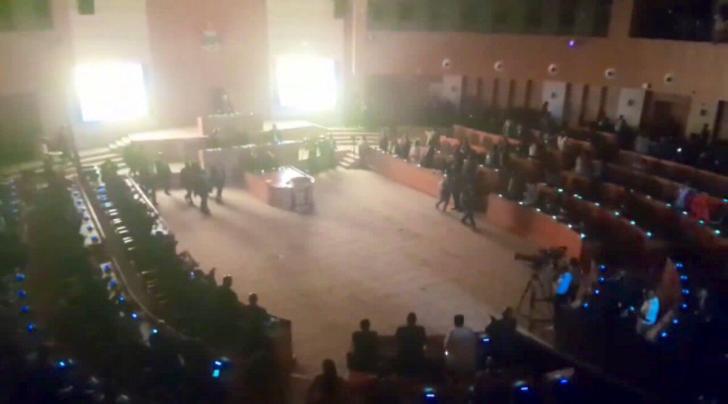News / National
Gata, Mthuli Ncube differ on load-shedding
04 Dec 2024 at 08:05hrs |
1 Views

The ongoing electricity crisis in Zimbabwe continues to dominate national discussions, with contrasting statements from key government officials regarding the future of load-shedding.
ZESA Chairman Sydney Gata has expressed optimism that the current power shortages will soon be a thing of the past, citing a series of major infrastructure projects aimed at generating 4,000MW. Gata's comments came during the official launch of a 720MW thermal power project and a 200MW solar initiative in rural Hwange, which were unveiled by President Emmerson Mnangagwa as part of the government's strategy to tackle the country's crippling load-shedding regime.
Gata, visibly emotional, stated, "Muviri wangu wese unochema maronda ekutukwa nenhau ye load shedding. Haaa varume ndasakara (My body is sore with a lot of scars of being insulted over load-shedding. Gentlemen I'm torn)." He then assured the nation that the new projects would mark the end of load-shedding, adding, "Today I can stand before the nation and say this project will mark the end of load-shedding. This is one out of 18 projects being spearheaded by companies in mining, industry and commerce whom we invited after the Kariba disaster."
Despite Gata's assurances, Finance Minister Mthuli Ncube painted a more cautious and grim picture during his budget speech last week. Ncube acknowledged some recent progress in expanding Zimbabwe's electricity generation capacity but warned that significant challenges remain. He stated that the country's electricity sector is still facing power supply deficits, with installed capacity insufficient to meet growing local demand, resulting in prolonged load-shedding.
According to Ncube, the situation is unlikely to improve substantially in the short-term, with projections showing a significant power deficit will persist until 2030. "The situation continues to weigh down on production and the competitiveness of the economy. Energy demand from industry and the country's thrust to end energy poverty in all communities is expected to increase electricity demand substantially in the medium term," he said.
The minister also highlighted that while power generation is expected to increase by 10.6% in 2025, reaching 10,000GW, this will still fall short of the projected demand of 19,000GW. He noted that the increase in electricity generation would primarily come from Hwange Units 7 and 8 and additional output from renewable energy by Independent Power Producers. However, Ncube cautioned that despite these efforts, a significant power deficit is expected to persist for years.
Gata's optimism contrasts sharply with Ncube's assessment, leaving the public with mixed messages regarding the future of load-shedding in Zimbabwe. As the country grapples with ongoing power shortages, the government's approach to addressing the crisis through new projects, investments, and power generation growth remains a subject of intense debate.
While Gata remains hopeful that the new power projects will resolve the load-shedding issue, Ncube's warnings suggest that Zimbabwe may still face significant energy challenges in the medium to long term.
ZESA Chairman Sydney Gata has expressed optimism that the current power shortages will soon be a thing of the past, citing a series of major infrastructure projects aimed at generating 4,000MW. Gata's comments came during the official launch of a 720MW thermal power project and a 200MW solar initiative in rural Hwange, which were unveiled by President Emmerson Mnangagwa as part of the government's strategy to tackle the country's crippling load-shedding regime.
Gata, visibly emotional, stated, "Muviri wangu wese unochema maronda ekutukwa nenhau ye load shedding. Haaa varume ndasakara (My body is sore with a lot of scars of being insulted over load-shedding. Gentlemen I'm torn)." He then assured the nation that the new projects would mark the end of load-shedding, adding, "Today I can stand before the nation and say this project will mark the end of load-shedding. This is one out of 18 projects being spearheaded by companies in mining, industry and commerce whom we invited after the Kariba disaster."
Despite Gata's assurances, Finance Minister Mthuli Ncube painted a more cautious and grim picture during his budget speech last week. Ncube acknowledged some recent progress in expanding Zimbabwe's electricity generation capacity but warned that significant challenges remain. He stated that the country's electricity sector is still facing power supply deficits, with installed capacity insufficient to meet growing local demand, resulting in prolonged load-shedding.
According to Ncube, the situation is unlikely to improve substantially in the short-term, with projections showing a significant power deficit will persist until 2030. "The situation continues to weigh down on production and the competitiveness of the economy. Energy demand from industry and the country's thrust to end energy poverty in all communities is expected to increase electricity demand substantially in the medium term," he said.
The minister also highlighted that while power generation is expected to increase by 10.6% in 2025, reaching 10,000GW, this will still fall short of the projected demand of 19,000GW. He noted that the increase in electricity generation would primarily come from Hwange Units 7 and 8 and additional output from renewable energy by Independent Power Producers. However, Ncube cautioned that despite these efforts, a significant power deficit is expected to persist for years.
Gata's optimism contrasts sharply with Ncube's assessment, leaving the public with mixed messages regarding the future of load-shedding in Zimbabwe. As the country grapples with ongoing power shortages, the government's approach to addressing the crisis through new projects, investments, and power generation growth remains a subject of intense debate.
While Gata remains hopeful that the new power projects will resolve the load-shedding issue, Ncube's warnings suggest that Zimbabwe may still face significant energy challenges in the medium to long term.
Source - online
Join the discussion
Loading comments…





























